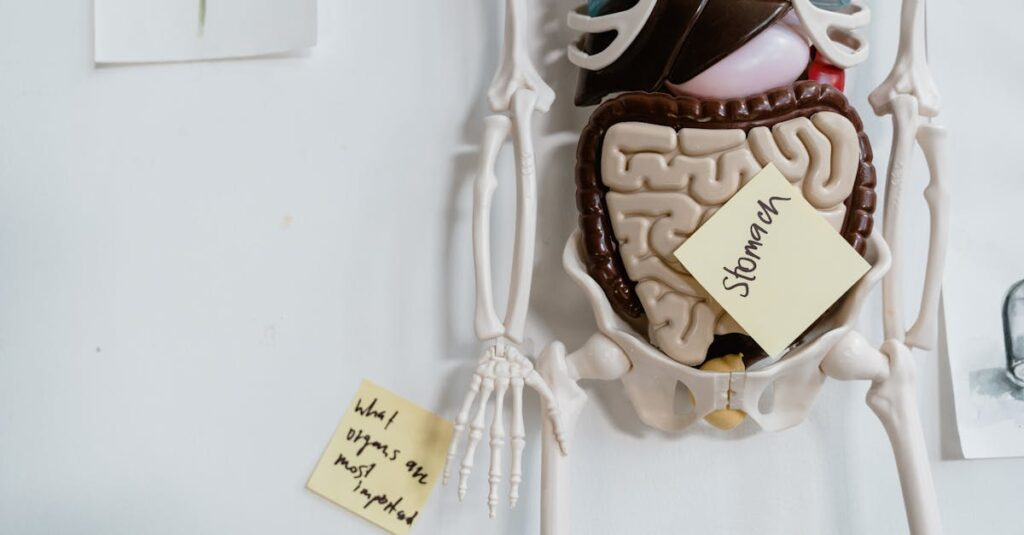Introduction-(How to heal your gut naturally)
Learn How to Improve Digestion and Gut Health Naturally with simple tips and lifestyle. When it comes to our overall health, the importance of digestion and gut health cannot be overstated. From absorbing nutrients to eliminating waste, your digestive system plays a critical role in keeping your body in balance. A well-functioning digestive system ensures that you are able to absorb essential vitamins and minerals, boosting energy levels, improving immune function, and even impacting your mood.
However, digestive problems such as bloating, constipation, acid reflux, and indigestion are common issues many people face. The good news is that you can improve your gut health naturally by incorporating simple yet effective lifestyle and dietary changes. At RajLife.com, we’re committed to providing you with the most reliable and scientifically-backed advice to help you live a healthier, more vibrant life.
In this article, we will explore how to improve digestion and gut health naturally, covering everything from nutrition and hydration to probiotics and mindful practices. Whether you’re struggling with specific digestive issues or simply want to maintain a healthy gut, this guide is for you.
Understanding Digestion and Gut Health
Before diving into natural remedies and practices, it’s essential to understand how digestion works and why gut health is so important.
The Digestive System: How It Works

The digestive system is a complex network of organs responsible for breaking down the food you eat, absorbing nutrients, and expelling waste. The journey begins in the mouth and continues through the esophagus, stomach, small intestine, large intestine, and rectum.
Key processes involved in digestion include:
- Mechanical breakdown (chewing, churning)
- Chemical breakdown (enzymes and stomach acid breaking down food)
- Absorption of nutrients in the small intestine
- Elimination of waste through the colon
Gut Health: More Than Just Digestion
Gut health refers to the well-being of the gastrointestinal (GI) system, especially the balance of microbes in the gut. This balance is known as the gut microbiome, which consists of trillions of bacteria, fungi, and other microorganisms. A healthy gut microbiome supports:
- Digestive health (smooth functioning of digestion)
- Immune function (70% of the immune system is in the gut)
- Mental health (gut-brain axis connection)
- Weight regulation (gut bacteria influence metabolism)
An imbalance in your gut bacteria, known as dysbiosis, can lead to digestive disorders, inflammation, and even chronic conditions like irritable bowel syndrome (IBS), celiac disease, and autoimmune diseases.
Natural Ways to Improve Digestion and Gut Health
Now that we understand the basics of digestion and gut health, let’s explore actionable steps to enhance your digestive function and maintain a healthy gut naturally.
1. Eat a Gut-Friendly Diet
What you eat plays a huge role in the health of your digestive system. Focusing on gut-friendly foods can help support healthy digestion, balance your microbiome, and reduce inflammation.
Include Fiber-Rich Foods
Fiber is essential for digestive health as it promotes regular bowel movements, supports beneficial gut bacteria, and prevents constipation. Focus on:
- Fruits: Apples, bananas, berries, and citrus fruits
- Vegetables: Leafy greens, carrots, broccoli, and spinach
- Whole Grains: Oats, quinoa, brown rice, and whole wheat
- Legumes: Lentils, beans, and chickpeas
Eat Probiotic-Rich Foods
Probiotics are live beneficial bacteria that support the gut microbiome. Including fermented foods in your diet can help improve digestion and boost your immune system.
Probiotic-rich foods include:
- Yogurt (with live cultures)
- Kefir (fermented milk drink)
- Sauerkraut (fermented cabbage)
- Kimchi (Korean fermented vegetables)
- Miso (fermented soy paste)
- Pickles (fermented cucumbers)
Prebiotics: Feed Your Good Bacteria
Prebiotics are a type of fiber that acts as food for the beneficial bacteria in your gut. They help stimulate the growth of healthy microbes and improve digestive health. Foods rich in prebiotics include:
- Garlic
- Onions
- Leeks
- Asparagus
- Bananas
- Chicory root
- Jerusalem artichokes
Omega-3 Fatty Acids
Omega-3 fatty acids have anti-inflammatory properties that can help reduce inflammation in the gut. They are particularly beneficial for conditions like IBS and inflammatory bowel disease (IBD). Include these in your diet by eating:
- Fatty fish: Salmon, sardines, mackerel
- Chia seeds
- Flaxseeds
- Walnuts
2. Stay Hydrated
Proper hydration is crucial for digestion. Water helps break down food so that your body can absorb the nutrients. It also softens stool, preventing constipation.
Try to:
- Drink plenty of water: Aim for at least 8 glasses a day, or more if you’re physically active.
- Limit sugary drinks: Sugary sodas and juices can disrupt gut health and lead to inflammation.
Tip: Drinking a glass of warm water with lemon first thing in the morning can stimulate your digestive system and improve bowel movement.
3. Include Digestive Enzyme-Rich Foods
Digestive enzymes help break down the food we eat into smaller, more absorbable particles. While the body naturally produces these enzymes, certain foods can also support this process.
Foods that aid digestion include:
- Pineapple (contains bromelain)
- Papaya (contains papain)
- Ginger (stimulates bile production)
- Peppermint (helps relieve bloating and gas)
4. Consume Bone Broth
Bone broth is a nutrient-dense liquid made by simmering bones and connective tissue. It is rich in collagen, amino acids like glutamine, and minerals like calcium, magnesium, and phosphorus, all of which support gut health. Bone broth helps repair the intestinal lining, reduces inflammation, and promotes the growth of healthy gut bacteria.
Tip: Sip on bone broth between meals or use it as a base for soups and stews.
5. Avoid Processed Foods and Sugar
Processed foods and excessive sugar can disrupt gut health by promoting the growth of harmful bacteria and fungi in the gut. A diet high in processed foods can also cause inflammation, leading to digestive issues and an imbalance in your gut microbiome.
To improve your digestion and gut health, aim to:
- Limit processed snacks: Chips, cookies, sugary cereals, and fast food
- Reduce refined sugar intake: High sugar consumption feeds harmful gut bacteria
- Avoid artificial sweeteners: These can negatively affect gut bacteria balance
6. Practice Mindful Eating
How you eat is just as important as what you eat. Practicing mindful eating can improve digestion by reducing stress and promoting proper chewing and absorption.
Tips for mindful eating:
- Chew slowly: Take your time to chew food thoroughly (20–30 times per bite).
- Eat smaller meals: Large meals can overload your digestive system, causing bloating and discomfort.
- Limit distractions: Eat without distractions like phones or TV to focus on the act of eating.
- Avoid overeating: Eating until you’re full rather than stuffed helps prevent digestive discomfort.
7. Manage Stress
Chronic stress can wreak havoc on your digestive system. It can disrupt the gut microbiome, leading to issues like IBS, acid reflux, and bloating. The gut-brain connection means that when you’re stressed, your digestive system can react negatively.
Effective stress management strategies include:
- Meditation: Practices like mindfulness meditation help activate the parasympathetic nervous system (rest and digest mode).
- Exercise: Regular physical activity reduces stress and improves gut motility.
- Yoga: Yoga poses can promote relaxation and improve digestion.
- Deep breathing: Breathing exercises can help reduce stress and stimulate digestion.
8. Get Enough Sleep
Good quality sleep is essential for overall health, including gut health. Sleep helps regulate the gut microbiome, allowing beneficial bacteria to thrive. On the other hand, poor sleep can alter gut bacteria and impair digestion.
To improve your digestion:
- Aim for 7–9 hours of sleep each night.
- Follow a regular sleep schedule by going to bed and waking up at the same time every day.
- Create a relaxing bedtime routine (e.g., avoiding screens, reading, or taking a warm bath).
9. Consider Probiotics and Prebiotic Supplements
If you are struggling with digestive issues or want to maintain a balanced gut microbiome, you might consider adding probiotic and prebiotic supplements to your diet. Probiotics are available in supplement form, with different strains offering various benefits. Prebiotics, which feed your good bacteria, are also available in supplement form.
Note: Always consult with a healthcare professional before starting any supplement regimen.
Final Thoughts
Improving digestion and gut health naturally requires a combination of healthy eating habits, hydration, stress management, and mindful practices. By incorporating these tips into your daily routine, you can promote better digestion, improve nutrient absorption, and cultivate a balanced gut microbiome.
Remember that maintaining gut health is not a one-time fix, but a continuous lifestyle commitment. Your gut, like your body, thrives on consistency, so make these practices a part of your daily life.
For more tips on improving overall health and wellness, visit RajLife.com for expert advice and insights.









